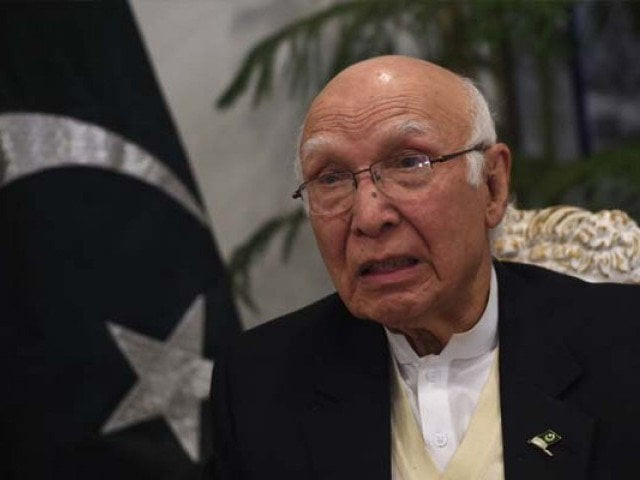Sartaj's statement on Saudi alliance in line with defence ministry position, Senate body told
Saudi authorities had said the alliance will take action against rebel groups posing a threat to any member country

Sartaj Aziz. PHOTO: AFP
On June 2, Aziz insisted that Pakistan is free to choose which activity of the Saudi-led Islamic military alliance it wants to participate in or not but failed to satisfy the Senate on the mandate of the 41-nation coalition.
According to the adviser, the Saudi foreign minister had conveyed to him two years ago that member states would be free to decide if they want to take part in or abstain from any activity of the alliance.
Saudi authorities had reportedly stated that the Islamic military alliance will not be restricted only to terrorist organisations such as Da’ish and al Qaeda, but would also take action against rebel groups posing a threat to any member country, on that country’s request.
The secretary informed Senate's committee on rules of procedure and privileges in its meeting the statement was in coordination with the defence minister.
Saudi military alliance: Pakistan seeks to find a middle ground
He told the committee that the reason the defence minister did not appear in Senate and did not give a statement was because he had other commitments and would provide a comprehensive reply later.
The matter was disposed of after hearing the secretary defence.
On June 5, the government decided to take the issue of joining the Saudi-led 41 nation military alliance against terrorism to parliament in a calculated move to ensure a delicate balance in a crucial foreign policy decision that has huge repercussions for Pakistan.
The meeting was held under the chairmanship of Senator Jehanzeb Jamaldini at the Parliament House and was attended, among others, by Senators Osman Saifullah, Farhatullah Babar, Yaqoob Nasir, Ateeq Shaikh, Shahi Syed, Saleem Zia.



















COMMENTS
Comments are moderated and generally will be posted if they are on-topic and not abusive.
For more information, please see our Comments FAQ